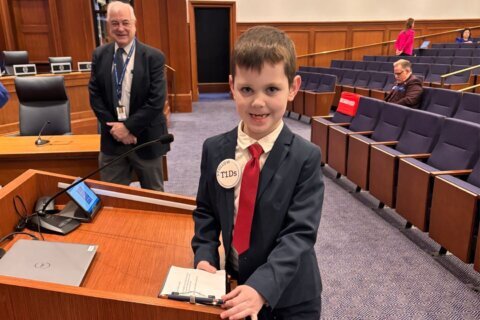All fraternity and sorority members in Virginia will now receive mandatory training on hazing after Gov. Glenn Younkin signed Adam’s Law. The measure is named after a student who died at Virginia Commonwealth University in 2021.
“He was just a lovable teddy bear,” said Courtney White of her cousin. “I mean, he was the sweetest thing that you could ever imagine. He loved and cared about everyone and took care of everybody.”
Adam Oakes, of Sterling, was a student at VCU and had just joined a fraternity there. On Feb. 26, 2021, he took part in a “big brother” ritual where he was told to drink excessively including an entire handle of Jack Daniels.

“They tried to get him to throw up … He couldn’t throw up like physically — he just wasn’t a able to throw up the alcohol. And they drug him back into the house and they left him on the cold, hard floor,” White told WTOP.
Oakes died of alcohol poisoning sometime during the night, and emergency services finally got a call from one of his friends who went to check on him.
“When the medical examiner checked his blood alcohol content, it was 0.419. It’s five times the legal limit,” said White.
Adam’s parents, White and other family members pushed for an investigation into the incident and have seen numerous members of the fraternity charged for hazing and supplying alcohol to minors.
“But you also need to be proactive in giving them the tools they need to say no to hazing,” said White. “We really thought about what Adam didn’t have that night in February that he really needed. And so we established Adam’s law.”
Adam’s Law passed both chambers in the Virginia legislature earlier this year and received Youngkin’s signature Monday.
Starting in the fall, every member of a college student organization will get training on hazing and alcohol poisoning.
“And it cannot just be a simple webinar. It has to be in-person, and extensive training on hazing for all new members, potential new members and current members, as well as the advisers of all student organizations,” said White. “Adam didn’t get any … training before he joined.”
In addition to training, it would also require all student organizations to publish hazing violations clearly on their websites, as well as grant immunity to any bystander that calls 911.
White and the Oakes family have also pushed for another bill that would bring stiffer penalties for those convicted of hazing. It has stalled, but White hopes it will pass in Virginia’s special session.
She vowed to bring it back next year if it does not.
“I just tried to continue that legacy of being kind to others, but yet at the same time, creating change that protects, because I think he would be in agreement. The bottom line is to protect others from this ever happening again to anybody else,” concluded White.








